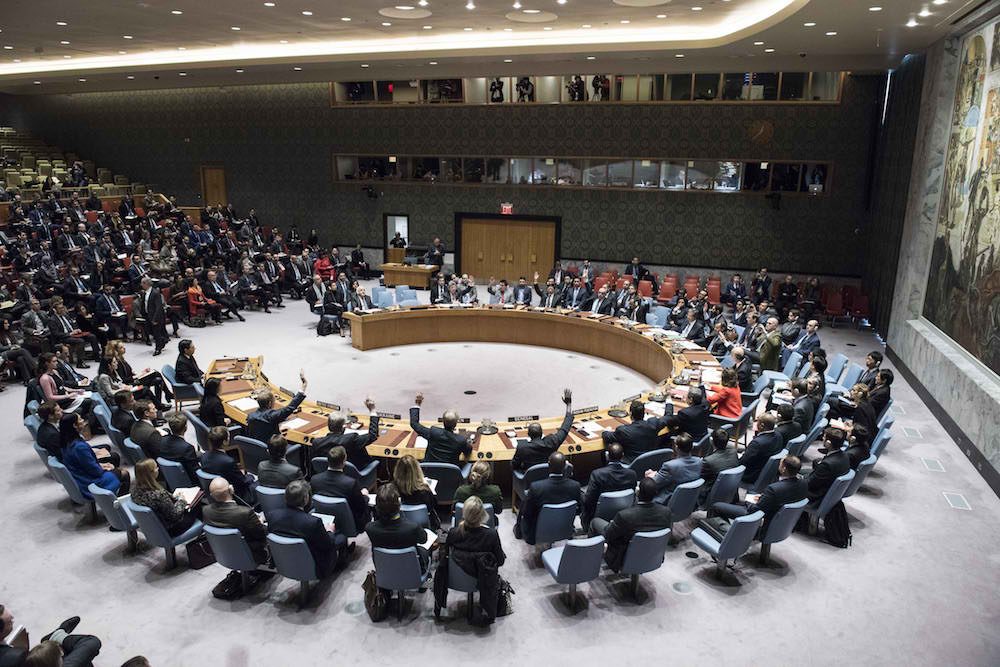SUMMARY
This is AI generated summarization, which may have errors. For context, always refer to the full article.

UNITED NATIONS – The United States on Monday, December 18, vetoed a draft UN resolution rejecting President Donald Trump’s decision to recognize Jerusalem as Israel’s capital, after all 14 other Security Council members backed the measure.
The veto cast by US Ambassador Nikki Haley highlighted Washington’s isolation over Trump’s announcement that the US embassy will be moved from Tel Aviv to Jerusalem, effectively ignoring Palestinian claims on the city.
The shift by the Republican president, announced earlier this month, broke with international consensus, triggering protests across the Muslim world and strong condemnation.
Key US allies Britain, France, Italy, Japan and Ukraine were among the 14 countries in the 15-member council that voted in favor of the proposed measure put forward by Egypt.
The draft resolution reaffirmed that Jerusalem is an issue “to be resolved through negotiations” between Israel and the Palestinians and that any decisions on the status of Jerusalem “have no legal effect, are null and void and must be rescinded.”
“The United States will not be told by any country where we can put our embassy,” Haley told the council after the veto.
“What we witnessed here today in the Security Council is an insult. It won’t be forgotten,” she said, describing the measure as “one more example of the United Nations doing more harm than good in addressing the Israeli-Palestinian conflict.”
The text expressed “deep regret at recent decisions concerning the status of Jerusalem” – without specifically mentioning Trump’s move.
Resolutions presented to the council require nine votes for adoption, but the United States – along with Britain, China, France and Russia – have the power to veto any measure.
‘Thank you’ from Netanyahu
Israeli Prime Minister Benjamin Netanyahu immediately thanked Haley, posting on Twitter: “Truth defeated lies. Thank you, President Trump. Thank you, Nikki Haley.”
The Palestinians slammed the veto as “unacceptable” and vowed to turn to the UN General Assembly to push for a resolution condemning the decision. No country has the power to veto resolutions in the 193-nation assembly.
“Regrettably one state decided to oppose the whole world and to stand against the whole world with regard to this long-standing issue,” Palestinian ambassador Riyad Mansour told the council.
“The United States chooses to disregard international law and ignore the international consensus,” he charged.
US Vice President Mike Pence will visit Jerusalem on Wednesday, wading into the crisis over one of the most controversial issues in the Israeli-Palestinian conflict.
Israel seized control of the eastern part of the city in the 1967 Middle East war and sees all of Jerusalem as its undivided capital. The Palestinians view the east as the capital of their future state.
The draft resolution had included a call on all countries to refrain from opening embassies in Jerusalem, reflecting concerns that other governments could follow the US lead.
Going back a ‘century’
Washington’s closest allies, France and Britain, came out ahead of the vote to declare their backing for the measure, which they said was in line with positions enshrined in UN resolutions adopted over several decades.
Several UN resolutions call on Israel to withdraw from territory seized during the 1967 war and have reaffirmed the need to end the occupation of that land.
The status of the city must be decided through negotiations and “not by the unilateral decision of a third country that would bring us back a century,” said French Ambassador Francois Delattre.
Despite outrage over the US decision, the United States “will continue to play an extremely important role in the search for peace in the Middle East,” said British Ambassador Matthew Rycroft.
The US veto on Jerusalem came nearly a year after the previous US administration abstained in a council vote condemning Israeli settlements, allowing that measure to pass.
Haley, who used her veto power for the first time as US ambassador, stressed that the United States still supports a two-state solution “if that’s what the parties agree to.”
Palestinian president Mahmud Abbas has scrapped a meeting with Pence in protest at the Jerusalem announcement, and will instead head to Saudi Arabia to meet King Salman and Crown Prince Mohammed Bin Salman.
Turkey meanwhile said it hopes to soon open an embassy to Palestine in East Jerusalem. – Rappler.com
Add a comment
How does this make you feel?
There are no comments yet. Add your comment to start the conversation.